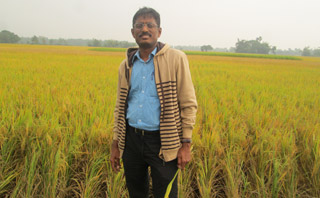
Fighting for farmers’ rights and teaching them sustainable farming methods—these are two of the main objectives of Centre for Sustainable Agriculture, Hyderabad.
After the Toxic Food episode was aired, the NGO was flooded with hundreds of visitors and received many phone calls enquiring about its Non-Pesticidal Management Programme. In fact, rural development departments in Bihar, Odisha, Jharkhand and Assam are promoting this model of sustainable agriculture as well.
With the funds raised through the show, the organization plans to establish a new training centre that will impart knowledge and skills about ecological farming to grassroot-level workers and civil society organizations. For this, it has bought 1.29 acres of cultivable land in Adavimasjid village, Andhra Pradesh.
The centre has also initiated a programme to meet the seed requirements of farmers in and around Adavimasjid. Besides this, a community compost unit is being set up in the village to convert urban waste into manure.
The fight against the use of pesticides in agriculture may be long and arduous. However, the efforts taken by NGOs like Centre for Sustainable Agriculture could take us towards a greener future.
“Sales at farmers’ cooperatives that promote pesticide-free production and organic stores across the country, jumped after the episode.”
- Dr. G. V. Ramanjaneyulu, Executive Director, Centre for Sustainable Agriculture
About Centre for Sustainable Agriculture
Centre for Sustainable Agriculture is engaged in establishing models of sustainable farming in 150 villages across Andhra Pradesh, Maharashtra, Punjab and Chhattisgarh. The NGO works to improve the quality of life of farming communities by promoting methods that will enhance both the quality and quantity of crop and animal yields. It also promotes the sharing of knowledge, material and human resources, and serves as a repository for collecting, documenting and disseminating information on sustainable agriculture.